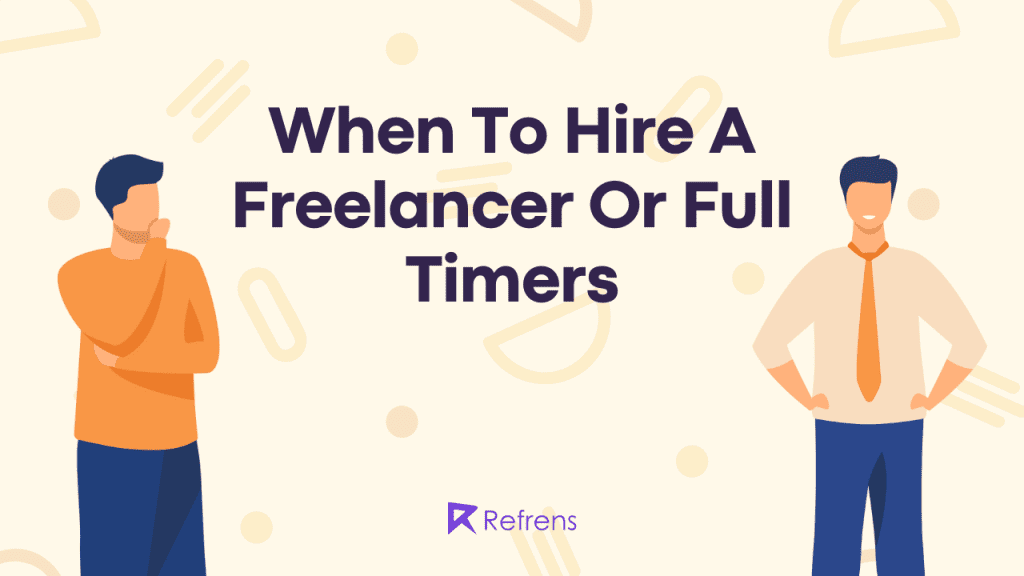As Lawrence Bossidy said, “Nothing we do is more important than hiring and developing people. At the end of the day, you bet on people, not on strategies.”. The emphasis on correct recruitment holds true in the light of the fact that businesses are built on the kind of synergy that its people bring to it.
Nowadays, businesses are often faced with the dilemma of whether to hire a freelancer or a full-time employee. Before you make a decision, learn about the various aspects that need to be considered. Finding a suitable employee is a time-consuming task, and businesses have budget constraints too.
Having freelancers in your team can prove to be advantageous. Working with freelancers can result in savings on expenditure and lower risk. While for some businesses this strategy may excel, for other types of businesses the drawbacks of it can overpower the strengths. The businesses prefer the high degree of commitment and concentration that comes with full-time employees.
For small businesses or startups, it is required to consider the pros and cons of hiring full-timers Vs freelancers based on different factors. Read the article further to learn what is more suitable for your business.
Factors To Consider While Hiring Between Freelancers Vs Full-Timers
- On The Basis Of Work
A freelancer could be a perfect choice if the business needs an additional human resource to complete any specialized tasks, or when you may not have an internal employee possessing the skill set required to accomplish the project. This helps in cost reduction and allows flexibility.
Having a full-time employee for this may not lead to maximum usage of their capabilities at all times. Instead hiring a highly qualified expert for a specified short-term task is a smarter way to work.
However, if you require a permanent commitment of a person with an area of expertise, or if the business is constantly demanding a need for a specific task, go for full-time employees. Regularly outsourcing work can be a tedious task. Plus there is no guarantee that the next time you need the job to be done, that specific freelancer is available. With full-time employees, the flow of communication runs smoothly too and the work is finished in a convenient fashion.
Do you have enough work? That is the question one should ask oneself. With a full-time hire, you are responsible for their career path and constant growth. There is no such onus on you in the case of a freelancer.
- Working Methodology
Another factor to consider is the way of working. For companies that create different teams for each project, hiring a freelancer is the way to go. Freelancers can bring new energy, fresh ideas, and quality work to the table. Along with gaining maximum cost efficiency, you can be highly selective in choosing the freelancer for quality assurance of the work.
Laying confidence in freelancers can be a good thing, as they also want repeat customers. Hence, they strive for the best work to maintain long-term relations.
While with full-time employees you can witness highs and lows in their performance over time. If you are concerned about the amount of control you have over the work to be done, to an extent hiring a freelancer takes away that right. When navigating the decision between full-time employee vs hiring a contractor, it’s crucial to weigh this consideration carefully.
- Budget Constraints
Keep the budget allotted in mind. Freelancers are experts in their fields. While working with them in the short run can help you in financial savings, in the long run, it can cost you a lot. Comparatively, full-time employees still prove to be more expensive, as you have to bear all the employee overhead expenses like insurance, bonuses, etc.
- Impact On Work Culture
If you have a larger budget, go for a full-time employee. They help in creating a stable work environment. By creating lasting relationships, they bring a strong and help maintain an internal work culture inside the business.
- Attrition As A Factor
With freelancers, the contracts may come and go. There are fewer chances of working with the same freelancer over a long time. This might result in the suffering of the work quality, not all freelancers work on similar thinking or have an aligned take on a project. The constant disruption can hamper the working environment, along with loss of motivation for the other full-time employees due to inconvenience caused and inconsistency in working.
- Macroeconomic Factors
During economic recessions or low-demand periods for business, with freelancers, you have the flexibility of not hiring any. This is a major advantage for start-ups and small businesses. In busier sessions, you can have an extra team member and later cut off ties as the period ends. With full-time employees, it brings the burden of additional cost during low times.
What Are The Benefits Of Hiring A Freelancer?
It’s easier than ever to find freelancers who can assist your small business with certain tasks, whether they’re one-time jobs like website construction or ongoing needs like blog entry writing.
In either case, there are a few advantages to taking this path.
- Reduced Total Costs
The most obvious advantage of choosing a freelancer over a full-time staff is the instant financial reward. You may pay a freelancer a greater hourly or daily rate than a full-time employee, but you are not compelled to fund their health benefits. You’ll save money on office space and other resources if your freelancer works from home.
- Legal Issues Are Less Likely
Companies that hire freelancers are usually immune to harassment and discrimination lawsuits. This does not give you the license to mistreat or otherwise abuse your freelance personnel, but if you hire them on a freelance basis, you are less likely to face a lawsuit from an unhappy worker.
- It’s a Lot Easier To Move Freelancers Frequently Recruited On A Project-By-Project Basis.
It’s as straightforward and painless as writing an email to fire the freelancer. It’s fine if you take a chance on a freelancer and it doesn’t work out; you can always locate another. It’s far easier to fire a freelancer than it is to fire a salaried employee if your goals change and you need to scale back your operations.
- Make Use Of A Larger Talent Pool
When you engage a freelancer, you are not limited by the skill pool in your area. You can hire remote freelancers from anywhere in the world as long as they satisfy your specifications and meet your deadlines. If you hire labor in areas where the going wage is lower than your own, you may be able to save even more money.
- Access To An Expert Skill Set At A Reasonable Price
Have a highly particular or complex work, such as a data science project that necessitates extensive machine learning knowledge? A talented freelancer can complete the task for a fraction of the cost of a full-time employee with the same skill set. In this case, Ducknowl can help you in screening candidates who fit the criteria of skills set by the organization.
Check out the most in-demand skills!
What Are The Benefits Of Hiring A Full-Time Employee?
In some firms and for certain tasks, hiring a freelancer is simply not an option. In a retail store, for example, only an in-house employee can work the floor.
Other scenarios in which a small firm would benefit from hiring an employee include:
- Extensive Projects That Necessitate Great Attention To Detail
You simply cannot guarantee the quality of work a freelancer will do, particularly if the freelancer works remotely and outside your control. When working with a freelancer, expect revisions and re-dos, but hiring an in-house professional for in-depth jobs that require attention to detail and doing it right the first time makes more sense.
- In The Absence Of Full-Time Employees, Workplace Culture Fails
If you’re increasingly outsourcing important jobs to freelancers, leaving your full-time employees lonely, unsupported, and underpaid, you’ll have a workplace culture problem.
Even if your company is currently just you and your partner, if you solely hire transient freelancers, you’ll never build the kind of winning office culture that attracts great talent.
- A Higher Level Of Commitment To The Company
For a freelancer, your company may be just one of many projects vying for their time and attention.
Moreover, If you give your full-time employees a fair wage, they will devote their entire professional attention to your organization.
Full-timers will be even more driven to see the company flourish because a successful company offers greater opportunities and rewards for them. Freelancers are less committed in the company’s success because they know they will leave soon.
How Do You Choose Someone To Hire?
The decision to hire a freelancer or a full-time employee is mostly dependent on your company’s present demands.
Are you just starting off and want to keep your expenditures low? It’s generally best to recruit freelancers from other countries (or several freelancers) who can complete jobs at a lesser cost.
Or do you have a more established small business that wants to solidify its position in the industry and grow in a sustainable way? Short-term contract hires will lose out to full-time employees.
In either case, if you don’t continually assess your options and determine when each sort of expertise makes the most sense for you, your firm will suffer. If you keep an eye on your bottom line, you’ll be able to tell when it’s time to go freelance and when it’s time to go full-time.
Pros Of Hiring a Freelancer
- Access
With the rapid growth of talent-matching systems, even the most unusual worker can be found to fulfill your demands.
- Quality
Freelancers own and operate their own company, which survives on repeat business and repeat clients. To keep the relationship, they endeavor to submit their finest work every time. While the performance of employees may have peaks and valleys, freelancers are aware that their contracts are always subject to renewal.
- Cost
If you do not include them in pay for benefits like health insurance and retirement, as well as Medicare and Social Security, you can expect to save 20 to 30 percent yearly with a freelancer, even if you pay a higher hourly rate.
- Reduction Of Risk
Employer risk is decreased as freelancers are not employees. Freelancers do not have the right to unemployment insurance, rarely have the right to workers’ compensation benefits, and rarely have the right to suit for harassment or discrimination. They’re also easier to fire and replace if they’re not working out.
- Global Reach
Companies appeal to freelancers for talent outside of their local boundaries. With a limited budget, it is possible to expand or gain a better grasp of new markets. Using a freelancer can help you expand while lowering your risk if things don’t work out.
Cons Of Hiring A Freelancer
- Multi-Tasking
An independent contractor’s job is to expand their business. You must make certain that they are available on your schedule rather than theirs. When they’re available, they’re fantastic, but you should have a backup plan in case they’re not. As a backup plan, many businesses build a team of freelancers.
- Relationship Building
A freelancer may not be the best option if you want to create a customer base. In-house workers are aware of everything that is going on in the firm and may use that knowledge to their advantage when it comes to building relationships with clients. Freelancers do not have access to this information.
- Training And Supervision
When it comes to training, how much time will you have? Spending that money on a full-time workforce would be a better alternative if they need to get up and running immediately. Hire someone to supervise the position if it is required. A freelancer may choose to finish a task outside of normal business hours if you are unable to supervise their progress.
- Investment
While a freelancer wants to keep you as a client, your company’s success is not their primary goal. A full-time employee is more likely to feel invested in your firm and hence more motivated to contribute to its success.
Conclusion
There is no one-size-fits-all approach to ensuring that you’re employing correctly and avoiding being charged for misclassification, but there are some broad principles to follow.
In most cases, an independent contractor is in charge of their own business. They decide who, what, when, where, and how the work will be done, as well as the price.
The gig economy is permanently altering the job landscape. While hiring a freelancer isn’t the greatest choice for every job, it’s ideal for short-term projects, one-time tasks, infrequent work, or anything that doesn’t require you to work 9 to 5 or onsite.
There are more options than ever to locate the proper mix of in-house and freelance expertise to help your business thrive, as long as you categorize correctly. Services such as Remote make hiring in India easy by managing contracts, invoicing, and compliance – for freelancers and full-timers alike.
Freelancers are an ideal solution for the changing times and specialized need for work. You can broaden your geographical scope and recruit freelancers from other countries. When it comes to employing a talent, there are no limitations.
On the Refrens platforms, you may employ freelancers from a pool of more than 50,000 competent freelancers and agencies. A one-stop destination for freelancers looking for work and companies wishing to hire freelancers.


















